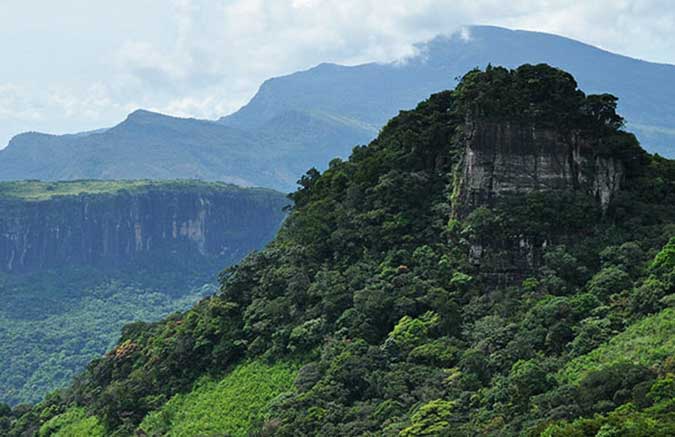Senior academics and conservationists express fears over Pidurutalagala slopes
Source:Island
A group of top level academics and environmentalists have written to President Ranil Wickremesinghe expressing grave concern about the degradation of the Mahakudugala Conservation Forest located in the uppermost on the slopes of Pidurutalagala, the country’s highest mountain.
“The numerous waterways that begin on its steep sides provide water, all year round, to the communities that inhabit the eastern escarpment of the Central Highlands, and to the rich biodiversity its forests host, high in endemism,” they have said in an open letter.
The text of their letter: “You have openly expressed your commitment to the protection of the watersheds of Sri Lanka,recognizing their vital importance for slowing, cleaning, filtering and storing water by allowing it to absorb into the ground. This process improves water quality, reduces risk of flooding, reduces risk for invasive species to establish and increases resilience within a changing climate; all vital for the future health and prosperity of this Nation.
“Your Excellency has also expressed your belief and intent in honouring Sri Lanka’s legally binding commitment to the three Rio Conventions, with the ultimate and essential intent of addressing climate change. With these noble intents, it may be horrifying for you to learn that both of the above ideals are being compromised on the slopes of this country’s highest mountain; Pidurutalagala. The numerous waterways that begin on its steep sides provide water, all year round, to the communities that inhabit the eastern escarpment of the Central Highlands, and to the rich biodiversity its forests host, high in endemism.
“And why is this survival disaster, for humans and nature, playing out? For growing apples!
The Proposed Apple Farm
“The proposed Apple Farm is situated in the Maha Kudugala GN Division of the Pidurutalagala Conservation Forest located entirely within the uppermost watershed, mainly of the Kurundu Oya, at an elevation range of 1500 m – 2100 m (over 5000 ft.) The land area of the Farm is 126 ha consisting of three blocks each of 89 ha, 12 ha, and 5 ha respectively. It has, however, never been used for the growing of apples, but for other agricultural purposes. Any clearing of these lands, for whatever purpose, has detrimental consequences to the ecological balance of this region, and the services it gives to the local communities downstream of it.
“In terms of hydrological importance, the Pedro Reserve was ranked Number Three (No. 3), just behind the Peak Wilderness and the Knuckles Range, of all the natural forests in Sri Lanka surveyed during the National Conservation Review (NCR 1996) conducted by the IUCN-The World Conservation Union with funding from the FAO. The main reason for gaining such a high rank is the contribution of fog interception by the natural forests to feed the streams originating from them, thus ensuring year-round water security. According to the IUCN-sponsored NCR (1996), the total fog contribution foregone by converting forest into agricultural land use is about 860,000 cubic meters per annum.
“This is why this land is so important and as a body of concerned Conservation / Environmental Groups, Scientists and Researchers, we plead with you to use your high office to prevent the destruction of a vital mountain forest, and upper watershed, for growing apples. Our deep concerns, and reasons for addressing you directly like this, are summarized in the attached paper, for study by your science advisors. We have also made suggestions for possible strategies that will not only help preserve this fragile, yet vital, forest for posterity, but also greater gain to the human communities that depend not only on this mountain forest, but others like it.
“We thank you for your time, and sincerely hope that you will not let this vital piece of Sri Lanka be exploited and destroyed, for the short-term profit of just a few.”
The signatories are: Prof. Nimal Gunatilleke, Prof. Siril Wijesundara, Mr. Rohan Pethiyagoda, Prof. Sevvandi Jayakody, Prof. Enoka Kudavidanage, Prof. Sampath Seneviratne, Dr. Sandun J. Perera, Dr. Suranjan Fernando, Mr. Hemantha Withanage, Centre for Environmental Justice and Mr. Jehan Canagaretna, Wildlife and Nature Protection Society








